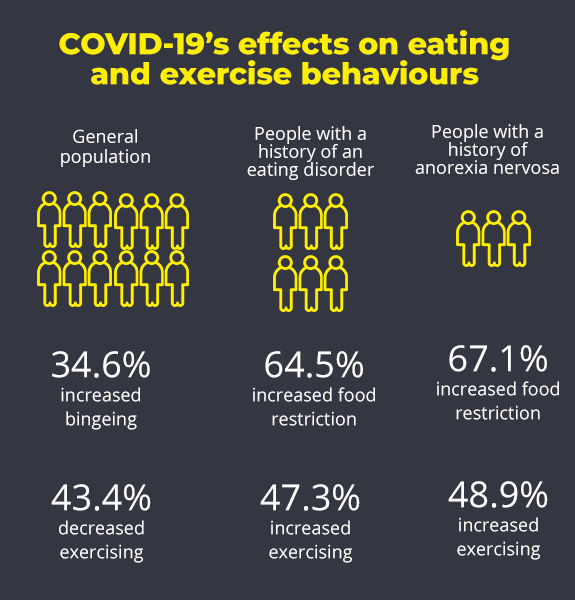Investigating the effects of COVID-19 on eating and exercise behaviours

In Summary
- Dr Andrea Phillipou has authored a paper on how COVID-19 has affected the eating and exercise behaviours of Australians
- Results showed a potential for adverse psychological and health consequences in the general population
- There is great need for psychological support for individuals to mitigate increasing disordered eating symptoms
A study has found that COVID-19 has resulted in reduced exercising and increased bingeing and restriction behaviours in the general population. This study, which was conducted by researchers from Swinburne’s Centre for Mental Health has been published in the International Journal of Eating Disorders.
“When the COVID-19 situation started, it was clear that it was likely to negatively affect the mental health of Australians, however how this pandemic would affect people’s eating and exercise behaviours was unclear,” says lead author and Senior Research Fellow at the Centre for Mental Health, Dr Andrea Phillipou.
To identify these changes, an Australia-wide survey was launched on 1 April 2020. The COVID-19 and you: mental health in Australia now survey (COLLATE) is an anonymous online survey that opens for 72 hours at the beginning of each month. The first COLLATE survey included a broad range of questions aimed at assessing the mental health impact of the COVID-19 situation on the Australian population.
Recording changes in eating and exercise behaviours
Four questions specifically relating to changes in restricting (deliberately limiting your amount of food); bingeing (eating an unusually large amount of food); purging (deliberately making yourself sick or taking laxatives to control your weight); and exercising behaviours were included in this survey. Respondents were specifically asked to report on changes in these behaviours since the COVID-19 situation started.
Data collected from this survey were analysed based on three groups of respondents: those who reported a history of eating disorders; a sub-group of those who reported a history of anorexia nervosa; and those who did not report a history of eating disorders (the ‘general population’).
Out of 5,469 respondents who completed the eating and exercise behaviours section of this survey, 180 self-identified as having an eating disorder. Of this group, 88 reported as having a history of anorexia nervosa.
A significant proportion of the eating disorder group reported an exacerbation in these behaviours since the pandemic started, particularly increased restriction (64.5 per cent) and exercising (47.3 per cent). Additionally, 35.5 per cent reported increased bingeing behaviours while 18.9 per cent reported increased purging behaviours.
Similarly, 67.1 per cent of respondents who identified as having a history of anorexia nervosa reported increased levels of restriction and 48.9 per cent reported increased levels of exercise. A smaller proportion of this sub-group reported increased bingeing (20.5 per cent) and purging (18.2 per cent) behaviours.

“These results show that even during the very early stages of this pandemic, (roughly three weeks after the official announcement by the World Health Organisation), this group of people were already reporting spikes in these behaviours. This could have been due to increased stress, anxiety and depressive symptoms as a result of social distancing measures,” explains Dr Phillipou.
On the other hand, of the respondents who did not report a history of eating disorders, 26 per cent reported a greater level of food restriction while 34.6 per cent reported increased bingeing behaviours since the pandemic started. In addition, 43.4 per cent reported less exercise than before the COVID-19 situation
A need for more psychological support
“Overall, we found that there is potential for adverse psychological and health consequences in the general population because of reduced exercising and increased bingeing behaviours since the COVID-19 situation. Critically, a spike in disordered eating behaviours was reported in individuals with eating disorders within the initial stages of the pandemic,” Dr Phillipou explains.
She adds, “it is crucial that we provide greater psychological support to individuals with eating disorders during this time. Given the uncertainty regarding the length of this pandemic and its rapidly evolving nature, it is essential that we continue to closely monitor these patients and provide greater support to attenuate increasing disordered eating symptoms.”
If you are interested in participating in future COLLATE surveys, you can sign up through this link.

